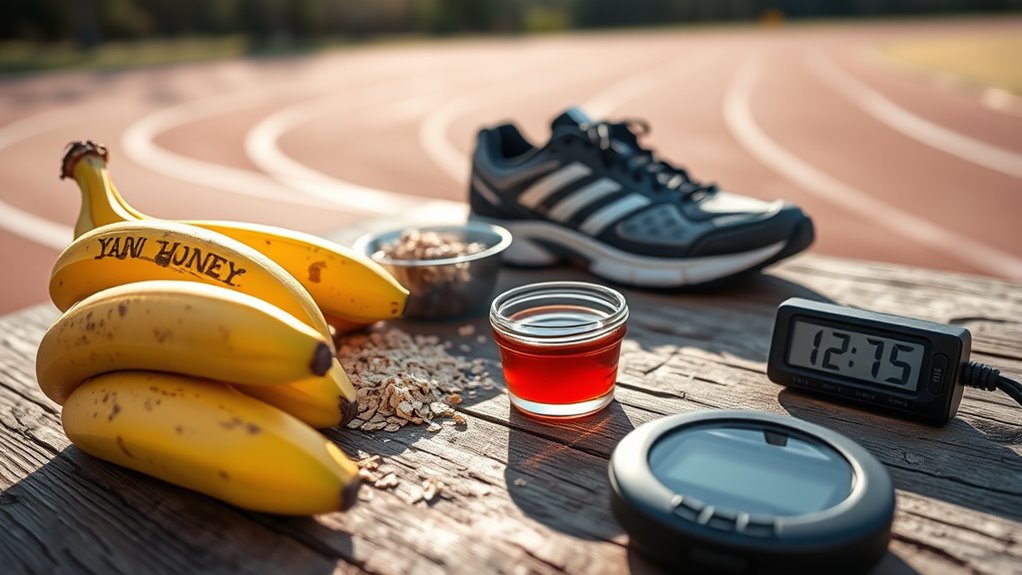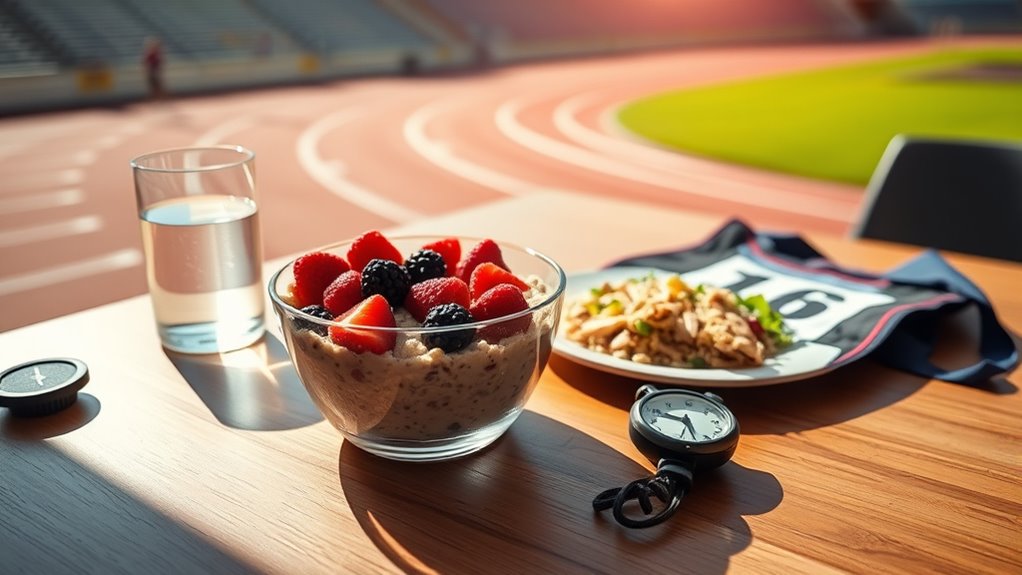One day before a race, focus on carbohydrate loading with easily digestible foods like pasta, rice, and fruits to maximize glycogen stores. Avoid heavy fats and proteins that can slow digestion. About an hour before the race, opt for a small, carbohydrate-rich snack such as a banana or energy gel to boost energy levels without causing discomfort. Staying hydrated and timing your meals properly will help you perform your best—more tips can guide your nutrition strategy.
Key Takeaways
- One day before: Focus on carbohydrate loading with easily digestible carbs like pasta, rice, and fruits to maximize glycogen stores.
- One hour before: Consume a light, carb-rich snack such as a banana or energy bar for quick energy and digestion.
- The day prior: Avoid heavy, greasy foods to prevent gastrointestinal discomfort during the race.
- One hour before: Limit fats and fiber to reduce sluggishness and stomach issues during activity.
- The day before: Hydrate well and include electrolyte-rich foods to support mineral balance and optimal performance.
The Role of Carbohydrates in Race Preparation

Carbohydrates play a crucial role in race preparation because they are your body’s primary energy source during high-intensity exercise. Understanding the glycemic index helps you choose the right carbs; foods with a low glycemic index release energy slowly, providing sustained fuel. To maximize your glycogen stores, carbohydrate loading is essential in the days leading up to the race. This strategy involves increasing your carbohydrate intake to ensure your muscles are stocked with energy, reducing fatigue and enhancing endurance. During this process, focus on easily digestible carbs like pasta, rice, and fruits. Proper carbohydrate timing ensures your energy levels are optimized, giving you the stamina needed for peak performance. Incorporating home decor materials in your diet, such as whole grains and fresh produce, can further improve nutrient absorption. Additionally, paying attention to glycemic index can help you select the most effective carbohydrate sources for sustained energy release. By paying attention to the glycemic index and carbohydrate loading, you set yourself up for a successful race.
Protein Intake for Recovery and Support

Protein is essential for repairing muscles and supporting recovery after intense training sessions or races. To optimize this process, focus on high-quality protein sources, which provide all essential amino acids needed for muscle repair. Incorporate dietary supplements like whey or plant-based protein powders if you struggle to meet your needs through food alone. Here are four key points to contemplate:
Protein is vital for muscle repair and recovery after intense training or races.
- Prioritize protein quality to maximize recovery.
- Consume protein within 30-60 minutes post-exercise for best results.
- Balance your intake with other nutrients to support overall healing.
- Use dietary supplements if necessary, but aim for whole foods first.
Fats: When and How Much to Consume

While fats are often viewed as a secondary energy source, knowing when and how much to consume can substantially impact your performance and recovery. Fats timing is key; you don’t need to load up on fats immediately before a race, but including healthy fats throughout your training days supports sustained energy and recovery. Aim for moderate fat intake in your meals leading up to the event, avoiding excessive amounts that might cause discomfort. About one hour before racing, minimizing fat intake helps prevent sluggishness and digestive issues. Focus on balanced meals with complex carbs and moderate fats earlier in the day to optimize energy stores. Incorporating nutrient timing strategies can further enhance your nutritional approach for peak race performance. Proper fat timing ensures you maintain energy without feeling weighed down, helping you perform at your best when it counts.
Hydration Strategies in the Days Leading Up to a Race

Proper hydration before a race involves balancing electrolytes and timing your fluid intake effectively. You should focus on maintaining electrolyte levels and drinking at strategic intervals in the days leading up to the event. These strategies help guarantee your body stays ideally hydrated and ready to perform.
Electrolyte Balance Optimization
Optimizing your electrolyte balance in the days leading up to a race is essential for maintaining hydration and preventing cramping. Proper mineral replenishment supports electrolyte absorption, ensuring your muscles function smoothly. To fine-tune your strategy:
- Consume electrolyte-rich foods like bananas, spinach, and nuts to boost mineral stores.
- Use electrolyte supplements if you sweat heavily or have high training volumes.
- Drink mineral water to naturally replenish key electrolytes.
- Monitor your hydration status by checking urine color, aiming for a light, straw-like hue.
- Incorporate tea accessories such as infusers and kettles to prepare hydrating beverages that support your electrolyte intake.
- Recognize that dog breeds with unique genetic traits may have different hydration needs, so tailoring your approach can be beneficial.
- Being aware of electrolyte absorption mechanisms helps in selecting the most effective replenishment methods.
- Staying consistent with your hydration routine enhances your body’s ability to maintain electrolyte balance, which is crucial for optimal performance.
Focusing on these steps helps keep your electrolyte levels balanced, reducing the risk of dehydration and cramping. Maintaining this balance allows your body to absorb electrolytes efficiently, supporting optimal performance on race day.
Hydration Timing Strategies
Timing your hydration in the days before a race is essential for ensuring your body is fully prepared. Focus on maintaining consistent water intake and incorporating hydration drinks that contain electrolytes to support optimum fluid balance. Aim to drink enough water throughout the day, but avoid overhydration that can lead to hyponatremia. Gradually increase your fluid consumption as the race approaches, especially if you’re in hot or humid conditions. Using hydration drinks with electrolytes helps replenish minerals lost during training and prevents dehydration. Pay attention to your body’s signals—thirst, urine color, and frequency—and adjust your water intake accordingly. Proper hydration timing prepares your muscles and tissues, giving you the best chance for peak performance on race day. Incorporating hydration strategies into your routine can further optimize your fluid levels and endurance.
Timing of Last-Minute Snacks Before the Start

As the start of your activity approaches, choosing the right moment for a last-minute snack can make a difference in your energy levels and overall performance. Proper snack timing guarantees you avoid hunger or sluggishness without causing discomfort. Consider these tips:
Choosing the right snack timing boosts your energy and prevents discomfort before activity.
- Consume a light snack 30-60 minutes before starting, like a banana or energy bar.
- Use energy gels if you need a quick boost during the race—take them 15-30 minutes before the start.
- Avoid high-fat or high-fiber foods, which can cause stomach issues.
- Stay hydrated and pair your snack with water for ideal digestion.
The Importance of Glycogen Stores and How to Maximize Them

Glycogen stores in your muscles and liver serve as the primary fuel source during high-intensity and endurance activities. When these stores are depleted, you’ll experience fatigue and reduced performance. To prevent glycogen depletion, focus on carbohydrate loading in the days leading up to your race. This involves increasing your carbohydrate intake to maximize glycogen storage without causing unnecessary weight gain. Proper carbohydrate loading guarantees your muscles have ample glycogen, allowing you to sustain effort longer and recover faster. It’s essential to start this process well before race day, as it takes time for your body to fully replenish glycogen reserves. By optimizing your glycogen stores, you’ll enhance energy levels and improve overall performance during your race.
Pre-Race Meal Composition and Portion Sizes

Your pre-race meal should prioritize carbohydrates to maximize your glycogen stores and boost energy. Keep portion sizes moderate to avoid discomfort, focusing on easily digestible foods. Balance your meal with some protein and healthy fats to support sustained energy without weighing you down.
Carbohydrate Focused Meals
Carbohydrate-focused meals are essential for fueling your body effectively before a race, providing the energy needed for peak performance. To maximize your meal timing, choose carb-rich foods that are easily digestible, such as pasta, rice, or fruit. Portion sizes should be moderate, ensuring you aren’t overloading your stomach while still replenishing glycogen stores. Keep in mind dietary restrictions—gluten-free options or vegetarian choices can still be high in carbs. Consider these tips:
- Focus on complex carbs for sustained energy.
- Eat 1-3 hours before the race for ideal digestion.
- Adjust portion sizes based on your body size and energy needs.
- Incorporate familiar foods to prevent digestive issues.
Portion Size Guidelines
To optimize your pre-race meal, paying close attention to portion sizes is essential, as overeating can cause discomfort and sluggishness, while eating too little may leave you lacking energy. Portion control helps you avoid these issues by ensuring you consume the right amount of fuel. Stick to appropriate serving sizes, such as a cup of cooked pasta or a medium banana, to provide steady energy without feeling weighed down. Using measuring cups or a food scale can help you maintain consistency and avoid overeating. Remember, your goal is to fuel your body efficiently without causing gastrointestinal distress. Adjust portion sizes based on your body size, training intensity, and personal tolerance, always prioritizing balance and moderation for peak performance.
Protein and Fat Balance
Balancing protein and fats in your pre-race meal is essential for sustained energy and digestion. Proper meal timing guarantees these nutrients support endurance without causing discomfort. To optimize your intake:
- Choose lean protein sources like chicken or fish to avoid sluggishness.
- Incorporate healthy fats such as avocados or nuts, but keep portions moderate.
- Avoid heavy, greasy foods that slow digestion during meal timing.
- Consider dietary supplements like omega-3s or protein powders if needed for extra support.
Portion sizes matter—they should complement your overall carbohydrate intake. Too much fat or protein can hinder digestion, while too little may leave you lacking energy. Adjust your pre-race meal based on your individual needs, and avoid drastic changes right before race day.
Nutritional Considerations for Different Types of Races

Different types of races demand tailored nutritional strategies to optimize performance and recovery. For endurance events like marathons or ultramarathons, focus on carbohydrate loading days prior to fuel sustained energy, and keep hydration levels high. Shorter races, such as sprints, require quick-access energy sources like gels or chews, so plan your race day gear accordingly. Consider your mental preparation—carbohydrate intake can influence mood and focus. For trail or mountain races, electrolytes become critical due to increased sweating and terrain challenges, so include salty snacks or electrolyte drinks. Each race type also impacts how you time your pre-race meals and snacks, ensuring your body is fueled without feeling weighed down. Adjust your nutrition plan based on the race’s length, terrain, and your personal needs.
Avoiding Digestive Discomfort Through Proper Timing

Proper timing of your nutrition can make a significant difference in preventing digestive issues during races. When you plan your meal timing strategically, you enhance digestive comfort and reduce the risk of cramps or nausea. To optimize your digestion, consider these tips:
Strategic meal timing boosts digestion and prevents race-day discomfort.
- Eat smaller, more frequent meals leading up to the race.
- Avoid high-fat or greasy foods close to your race time.
- Finish your last large meal at least 3-4 hours before the start.
- Stay hydrated but avoid drinking large quantities immediately before racing.
Post-Race Nutrition for Recovery and Sustained Performance

After a race, fueling your body with the right nutrients is essential for quick recovery and maintaining long-term performance. Proper post-race nutrition replenishes glycogen stores, supports muscle repair, and boosts sleep quality, which is crucial for recovery. It also helps sharpen mental focus for upcoming training. Aim for a balanced intake of carbohydrates and protein within 30 to 60 minutes. Hydrate well to replace lost fluids. To visualize, consider this table:
| Nutrients | Benefits |
|---|---|
| Carbohydrates | Replenish glycogen, boost energy levels |
| Protein | Repair muscles, reduce soreness |
| Hydration | Improve sleep quality, mental alertness |
| Healthy Fats | Support overall recovery and health |
This combo accelerates recovery, enhances sleep, and keeps your mental focus sharp for sustained performance.
Frequently Asked Questions
How Does Meal Timing Affect Race Day Energy Levels?
Meal timing plays a key role in your race day energy levels. Eating strategically helps with glycogen replenishment and maintains electrolyte balance, both essential for sustained performance. Consuming carbs and electrolytes in the hours before the race boosts your energy reserves, while a balanced meal a day prior guarantees your body’s ready. Proper timing keeps your energy stable, preventing fatigue and helping you perform at your best from start to finish.
Are There Any Foods to Avoid Before a Race?
Before a race, you should avoid foods that might cause digestive discomfort, like spicy or greasy options, especially if you have food allergies. Your pre-race diet should focus on easily digestible carbs and moderate protein. Steer clear of new foods or anything unfamiliar to prevent surprises on race day. Sticking to familiar, tolerated foods helps make sure your stomach stays calm and energy levels stay steady during your run.
Can Hydration Strategies Differ for Various Race Distances?
Hydration strategies definitely differ for various race distances. For shorter races, you should focus on maintaining hydration frequency and electrolyte balance with small, regular sips of fluids. For longer distances, you need to hydrate more strategically, combining water and electrolyte drinks to prevent dehydration and hyponatremia. Adjust your intake based on race duration, sweat rate, and environmental conditions to stay ideally hydrated and perform your best.
What Are the Best Quick Snacks Right Before the Race?
You want the best pre-race snacks for quick energy boosts, so choose easily digestible options like a banana, energy bar, or a small bag of pretzels. These snacks provide fast carbs that help top off your glycogen stores without causing stomach discomfort. Keep portions moderate and avoid heavy or greasy foods. With the right pre-race snacks, you’ll feel energized and ready to perform at your best.
How Does Nutritional Timing Impact Long-Term Training Adaptations?
Some believe timing isn’t essential for long-term gains, but consistent training combined with proper nutrient absorption actually enhances adaptations. When you fuel well around training sessions, you optimize recovery and muscle growth. Maintaining good nutrition timing supports your body’s ability to adapt, ensuring every workout counts. So, sticking to a routine helps your body absorb nutrients efficiently, strengthening your progress over time. Consistency truly makes a difference in achieving lasting results.
Conclusion
Remember, timing your nutrition can boost your race performance considerably. For example, eating the right carbs an hour before can increase your glycogen stores by up to 30%, giving you that extra energy boost. Whether it’s a quick snack or a well-planned meal days ahead, your choices matter. Stay mindful of what you eat and when, so you can cross that finish line feeling strong, prepared, and ready for whatever the race throws at you.









